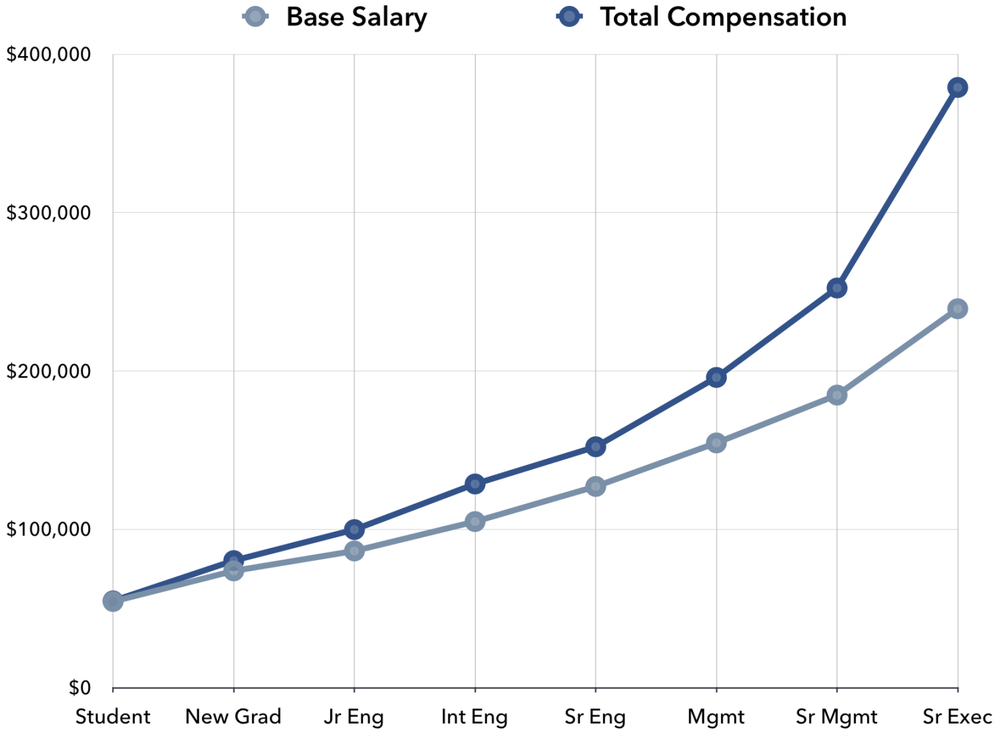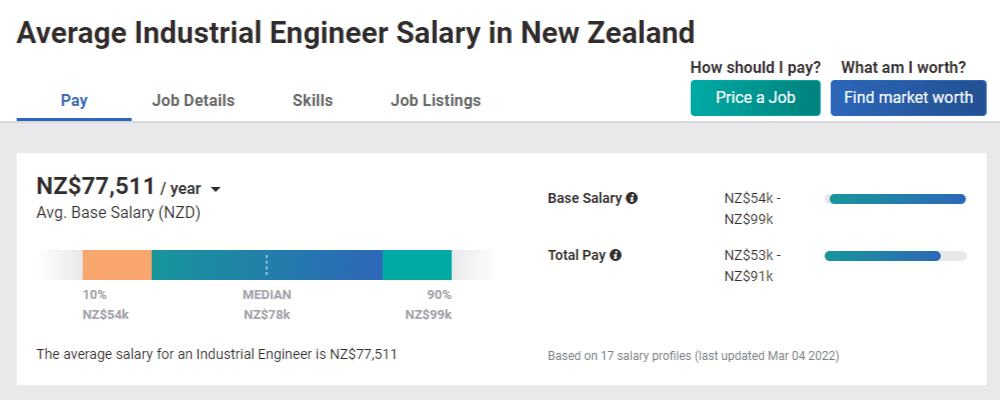
This article will examine the job of an industrial engineering engineer. We'll also discuss what they do, and what you need to do to be successful in this role. We will also talk about what to expect in your education, and the opportunities available for industrial engineers. You'll make a good living doing what you love and that will be a great beginning to a great career. Continue reading to learn more.
Career outlook for industrial engineers
Those interested in a career as an industrial engineer should have a strong technical and mathematical background. A bachelor's degree is often required for entry-level positions. Potential industrial engineers may also choose to major in electrical, mechanical, or computer engineering. Cooperative-education programs and other relevant coursework may help prospective industrial engineers improve their job prospects. Graduates may pursue a master's or bachelor's degree in addition to a bachelor's.

There are currently approximately 257,899 industrial engineers in the United States, and this number is expected to grow 9.7% from 2016 to 2026. This projection assumes that approximately 4,100 American industrial engineers will retire and that 25,101 new jobs will be created. If this trend continues, the job market is likely to remain robust, despite the decline in employment. While it's not easy to make a career as an industrial engineer, there are many perks to being one.
Duties of industrial engineers
Industrial engineers have many responsibilities. They are responsible for designing and analyzing systems to improve the productivity and workflow in a manufacturing plant. To be able to design efficient, quality-controlled, and productive production plans, industrial engineers need to have a solid understanding of manufacturing processes. They must have a thorough understanding of the company's policies and regulations in order to protect customers and workers. Industrial engineers also have many responsibilities, including the development of new ideas and overseeing production processes.
An industrial engineer examines the requirements of a product, or service, designs manufacturing process, and informs customers about information systems. Industrial engineers assist in financial planning, cost analysis, designing production-planning systems, as well as developing methods to ensure product quality. Industrial engineers also improve processes to better distribute services, determine the most suitable plant locations, and create workplace layouts. Industrial engineers study the design and layout of processes in order to maximize the efficiency of the entire manufacturing process.
For industrial engineers, there are specific educational requirements
Industrial engineers are problem solvers who use critical thinking skills and have a good understanding of manufacturing technology. This engineer must be able to manage entire production equipment and have an understanding of the project cycle. Strong interpersonal skills are essential for industrial engineers to motivate and recruit their team members. These skills are essential for negotiating with external parties. These are the minimum educational requirements to become an engineer in industry. These are the most important qualifications to pursue a career as an industrial engineer.

You will need to pass the Fundamentals of Engineering exam in order to get an industrial engineering degree. A professional engineering license is also an option. This shows your ability to manage a wide range of responsibilities. Employers may require FE licensure, although they are an optional requirement. FE licensure is a prerequisite for the Professional Engineer (PE) exam, although it is not a requirement for entry-level positions. Industrial engineers can also pursue graduate degrees for further education. These courses include Bayesian statistics, manufacturing systems, supply chain system, experimental design, and supply chain systems.
FAQ
What is a Mechanical Engineering Engineer?
A mechanical engineer designs machines for people, such as vehicles, tools, products and machinery.
Engineers in mechanical engineering use mathematics, science, and engineering principles for practical solutions to real-world problems.
A mechanical engineer could be involved with product development, maintenance, quality control and research.
Which engineer earns the most?
Software engineers, who are responsible for writing code for computers, would be the right answer. Software engineers also have the freedom to choose what type of project they would like to work on. Although software engineers can work in almost any industry, they prefer to work for tech companies like Google and Microsoft.
What are the jobs I can get as an engineer?
Engineers are able to find work in almost any industry, such as manufacturing, transport, energy, communications and finance.
Engineers who specialize in particular fields can often find employment at specific companies or organizations.
Electrical engineers could work, for example, in telecommunications companies or medical device manufacturers.
Software developers can work as website or mobile app developers.
Computer programmers may work for tech firms like Google, Microsoft, Apple, Amazon, Facebook, or IBM.
What do civil engineers do?
Civil engineering deals with the construction and design of large-scale structures, such as bridges, roads, buildings, dams and tunnels. It covers all aspects related to structural engineering such as building materials, foundations geotechnics hydraulics soils, safety analysis, environmental impact assessment and traffic management. Civil engineers ensure that the project meets its objectives while being cost-effective and environmentally friendly. They are responsible for ensuring that the structure is durable and safe.
They may also be involved in the planning and implementation of public works programs. For instance, they might oversee the planning and construction of a road, bridge, or tunnel.
What is a typical day like for an engineer?
Engineers spend a lot time working on different projects. These projects can include developing new products and improving existing ones.
They could be involved in research projects that aim at improving the world around them.
They could also be involved creating new technologies such computers, mobile phones and planes, rockets, or other devices.
Engineers must use their imagination and creativity to complete these tasks. Engineers must think outside of the box to find innovative solutions to problems.
So they will often be required to sit down and brainstorm ideas and concepts. They will also need equipment such as laser cutters CNC machines, 3D printing, laser cutters, CNC, computer-aided engineering software, etc. to test their ideas.
Engineers need to communicate well to convey their ideas to others. Engineers must create reports and presentations in order to share their findings with clients and colleagues.
They must also manage their time effectively in order to complete the tasks within the time allowed.
So no matter what type of engineering you choose, you'll need to be creative, imaginative, analytical, and organized.
Is engineering hard to learn?
It depends on the meaning of 'hard'. If you mean it is difficult, then you can say yes. However, if you mean boring, then you should not. Engineering is not difficult as it requires a lot of maths.
If you're interested in learning how to do something, then go for it! Engineering doesn't require you to be an expert.
Engineering can be fun as long you do something you enjoy.
You could say that engineering is easy once you know everything inside out. However, this is false.
People think engineers are boring because they haven't tried any other thing yet.
They're just sticking to the same old thing, day after day.
There are many ways to solve problems. Each solution has its benefits and drawbacks. They all have their advantages and disadvantages, so try them all and decide which one you like best.
What is a Chemical Engineer?
Chemical engineers employ math, science engineering, technology, as well as business skills to develop chemical processes and products.
Chemical engineers may specialize in such areas as pharmaceuticals, petroleum refining and food processing.
They work closely together with scientists and other researchers to solve technical difficulties.
Statistics
- Job growth outlook through 2030: 9% (snhu.edu)
- Typically required education: Bachelor's degree in aeronautical engineering Job growth outlook through 2030: 8% Aerospace engineers specialize in designing spacecraft, aircraft, satellites, and missiles. (snhu.edu)
External Links
How To
Which type or sub-type of engineering should you choose?
Engineering is an exciting career choice for anyone interested in technology. There are many types of engineers, each with its own set of skills and responsibilities. Some specialize in mechanical design while others focus on electrical systems.
Engineers often work directly alongside clients to design buildings or bridges. Others work behind-the scenes developing software or analyzing data.
Whatever type of engineer you choose, you'll learn how to apply scientific principles to solve real-world problems.
Students learn valuable communication and business skills in addition to technical skills. Engineers often work in collaboration with other professionals, such as accountants, managers or lawyers, to create new products and services.
You'll be able to explore topics such as mathematics, chemistry and physics while you are a student. In addition, you will be able to communicate clearly both verbally and written.
There are many career opportunities in engineering, no matter if you work for large companies or small startups. Many people get jobs as soon as they graduate. There are many other options available for those who want to continue their education.
You could get a bachelor’s degree in engineering. This would give you a solid foundation to help you find employment. Or, you could pursue a master’s program that provides additional training in specialized subjects.
A doctorate program allows you to delve deeper into a particular field. A Ph.D. is usually completed after four years of graduate school.